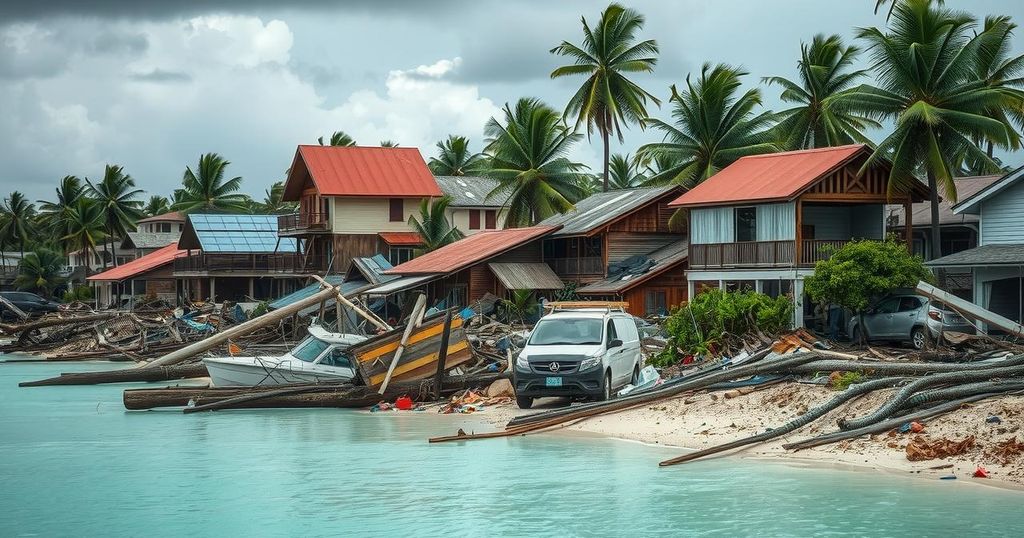Cyclone Chido Devastates Mayotte: Hundreds Feared Dead Amid Humanitarian Crisis

Cyclone Chido has severely impacted Mayotte, described by residents as apocalyptic, with wind speeds exceeding 225 km/h causing extensive damage, leading to food and water shortages. Official estimates of fatalities may rise to hundreds or potentially thousands. Rescue efforts are complicated by infrastructure devastation, and the healthcare system has been severely affected, prompting urgent calls for support and supplies.
Mayotte has been devastated by Cyclone Chido, which has wrought unprecedented destruction across the French Indian Ocean territory. This cyclone is reported to be the most severe storm to strike the region in 90 years, boasting wind speeds of over 225 km/h. The aftermath is described by residents as apocalyptic, particularly affecting areas where the underprivileged reside in flimsy metal-roofed homes. Water shortages persist, with residents reporting a complete absence of supply for several days, and food scarcity is increasingly alarming.
Rescue operations are underway, yet inefficiencies are exacerbated by the significant challenges posed by the ongoing infrastructure damage that has left roads impassable and communication lines down. Initial estimates indicate that at least twenty fatalities have been confirmed, but local authorities fear that the number could escalate into the hundreds or potentially thousands, especially given the challenges of accounting for undocumented migrants within the population.
A midwife on the island highlighted the dire situation by stating, “The water here is completely yellow. It’s unusable for us,” capturing the sense of isolation and neglect felt by many. Reports of large-scale destruction of basic utilities have emerged, with nearly 85% of the territory without electricity and only limited access to functioning telephones.
The health minister of France addressed the health crisis, acknowledging the severe degradation of the healthcare infrastructure and the pressing need for adequate supplies. Overall, there is a strong sense of despair among residents, compounded by widespread fears of hunger and lack of basic necessities. Support from France, including the deployment of military personnel, is on the way, with rescue efforts being coordinated from nearby Reunion Island.
The cyclone’s impact extends beyond Mayotte, with Mozambique also suffering from flash floods and structural damage. The situation continues to evolve as Cyclone Chido has been downgraded but will persist in bringing heavy rainfall in the coming days, raising further concerns for the vulnerable regions struck by its path.
Mayotte’s historical context adds layers to its current plight. Since becoming a French territory in the 19th century, it has grappled with socioeconomic struggles, including high poverty rates and reliance on French aid. The aftermath of Cyclone Chido underscores existing vulnerabilities and the urgent need for comprehensive humanitarian assistance, especially for those in precarious conditions.
Cyclones are severe storms that originate over warm ocean waters and are characterized by strong winds and heavy rainfall. Cyclone Chido, one of the most intense cyclones to affect Mayotte in nearly a century, has had devastating effects on both infrastructure and the local population. As an overseas territory of France, Mayotte faces unique challenges related to its economic status and reliance on aid, which is further complicated by an influx of undocumented migrants seeking asylum. Recognizing these distinctions is crucial for understanding the area’s vulnerabilities and the significant humanitarian impact anticipated after such catastrophic events.
In conclusion, Cyclone Chido has inflicted catastrophic damage across Mayotte, resulting in loss of life, destruction of homes, and widespread shortages of essential resources. The natural disaster has highlighted existing socioeconomic vulnerabilities and the urgent need for response and recovery efforts, especially for marginalized communities. The situation remains precarious, with ongoing threats of hunger, water scarcity, and health crises, necessitating immediate humanitarian intervention from local and international entities.
Original Source: www.bbc.com






